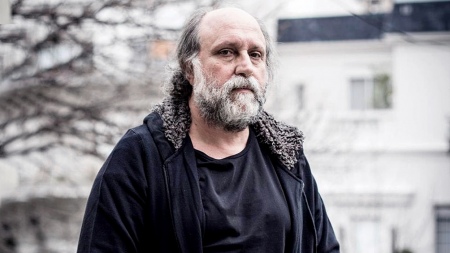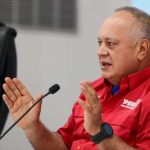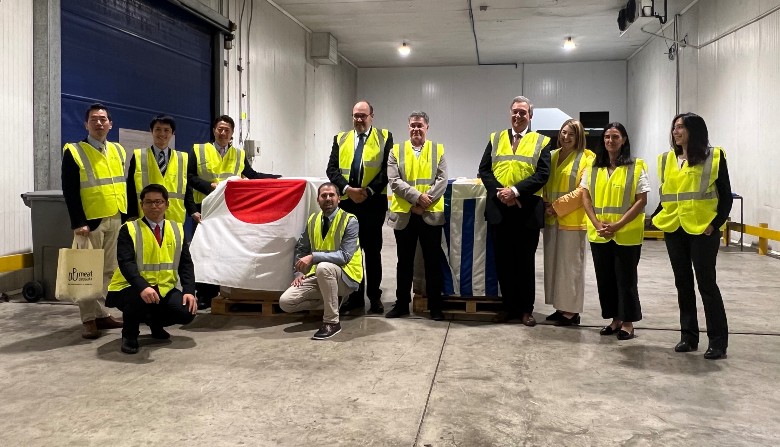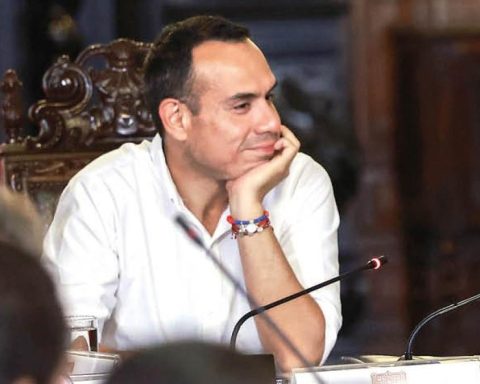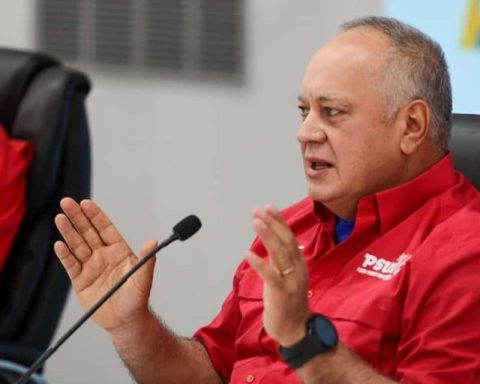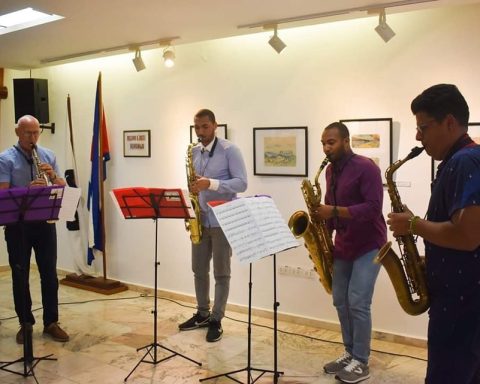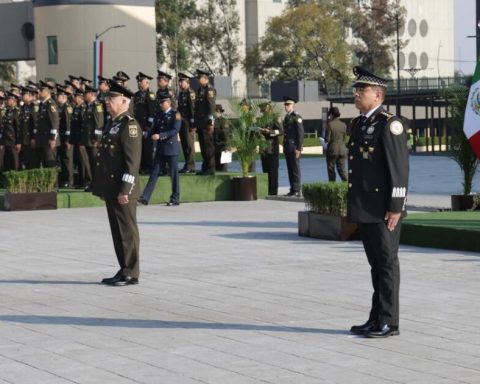In his biography “I love you, I hate you, give me more”, the manager, producer, businessman and representative Daniel Grinbank reveals secrets and sins of a rock scene that he knows perfectly wellreviewing the milestones of his career, the tours with the most important local bands, the creation of Rock & Pop or the visit of the Rolling Stones to Argentina, but also his mistakes, like that day in the 80s when he declined to sign a band called Soda Stereo, and other secrets like the song Peperina that Charly García composed for one of his lovers.
“Peperina’s lyrics say ‘whispering in the ear of my representative I love you, I hate you, give me more’, that’s me, the same one who says ‘her prince was a hippie from the 60s'”, says Daniel Grinbank (1954). in an interview with Telamwhen explaining the title of his biography, which has just been published by Planeta, where reviews why the entertainment industry in Latin America would not be the same without his presence.
“In the book I try to prioritize the businessman’s look, that is permanent, I am not an artist. And to show all my search, until today, that I am still in the entertainment industry, where I use the word reinvention, always from the business perspective. If you think back to the West Coast of the United States in the 1960s, the most emblematic festival that is Woodstock, in business terms it was a failure.”
The narrative begins in Los Angeles in 1972, when Grinbank, at the age of 18, after finishing high school, sent by his family, travels to meet his uncle Herb Cohen who lived in the United States, a fundamental person in his formation: ” Herb was the manager of Frank Zappa, he played in the Premier League of international show business.Thanks to him I had the privilege of accessing a world -when Argentina or Latin America was in another dimension of professionalism- that realized how far one could reach in the music. The ceiling here was very flat and he opens my head to another absolutely incredible world, and makes me see the difference between the business possibilities in one country and the other”, says the author.
The biography
A pleasant story, full of anecdotes, triumphs and several self-criticisms, structure the book, largely ordered chronologically, linked by reflections on the entertainment industry. After that founding trip to Los Angeles, Grinbank returned to Argentina and became a fundamental pillar of the rock bands of the time: he started as manager of the band Vivencia and produced Arco Iris in a nightclub in Miramar called Aku. -Aku. Plus, he learns the dynamics of a touring band on the road. “Everything was very incipient and there was a very strong cultural movement at first of national rock”, analyzes about that period in which everything was yet to be done.
Over there For example, the beginnings of Charly García and Nito Mestre appear with Sui Generis, the success of Serú Girán (“I felt like the fifth Serú”, he will say in a section of his biography), and places that marked the time such as Café Einstein, or the New York City bowling alley, in addition to the visit to Argentina of The Police, as part of the BUE festival, entangled in a scandal when guitarist Andy Summers kicked him in the head. head to a policeman who became violent with the public. In addition, Mercedes Sosa’s 13 shows at the Opera, which gave shape to the double album “Mercedes Sosa in Argentina”, one of his first great successes as a businessman. Just like Charly’s solo debut with “Yendo de la cama alliving”.
“In the book I try to prioritize the businessman’s look, that is permanent, I am not an artist. And to show all my search, until today, that I am still in the entertainment industry, where I use the word reinvention, always from the business perspective. If one thinks of the 60s on the west coast of the United States, the most emblematic festival that is Woodstock, in business terms it was a failure,” he elaborates.

Grinbank is also the person who marked a before and after in local radio with the arrival of Rock & Pop in the 80s, which filled stadiums and cities with shows by international artists and top-level shows. Later he also dared with television, theater, musicals, the Buenos Aires Zoo and even with soccer. In recent times, his career includes the tours of Violetta, with Tini at the helm, Soy Luna, Brunos Mars in La Plata, Gorillaz in Tecnópolis, just to give a few examples.
“Yes, I just wanted to sign Soda Stereo. I didn’t see it coming, Soda just escaped me,” Grinbank is sincere in a section of his autobiography, in reference to one of his mistakes, just like when the Suéter group presented their second album “Lluvia de gallinas” at the Coliseo. At that time, the ball spread that Kiss stepped on chicks in their shows and Miguel Zavaleta’s band came up with the idea of taking the title of the album into action, after visiting a corralón. “The chickens fell on the armrests of the seats and were fried right there, a grotesque absurdity, bizarre and highly condemnable”, “total irresponsibility and a photo of the moment of exaltation we were living”, admits the producer throughout these pages .
Grinbank admits that “in some sections, it is a politically incorrect story seen from today, but I preferred to be honest and respect the rigor of the facts as they were, in the book itself I raise it, I have a critical capacity, but they happened and they seem very graphic to me the reflection of some moments of madness, in which I participated and lived”.
In October 1985, Grinbank launched at the Rock and Pop Festival, a line up that included Fito Paez, Git, Virus, Los Abuelos de la Nada, Nina Hagen, La Torre, Miguel Mateos, INXS, Sumo, Soda Stereo and Charly. “The public at that time was very wild, there was no private security at events yet, like now,” he writes.
“If Charly had had all his creative potential in a time like today when platforms exist, he would have had another significance. Today the way we communicate has changed in the world. I understand Charly’s frustration because he is an extraordinary talent who would have had much greater recognition internationally if there had been other communication vehicles for him
“It was very difficult to make security because once democracy was restored there was contempt for all security systems and institutions. The Cure in Ferro was the most violent recital I had. It is not a myth that from the public they kicked to death dogs from the police. And it is a reflection of a time. And it was also an apprenticeship, which happened along the way, because an industry did not yet exist. Today there is experience gained and another level of professionalism”, he breaks down in the interview.
“I was encouraged to go to big concerts” he tells in another fragment about the first Ramones show in Obras, Sting in River and the world closing of the Human Rights Now tour organized by Amnesty.
The chapter “The Glory Years” opens the way to the manager’s career in the 90s, with one on one, and the first times in Argentina of bands like Bob Dylan, David Bowie, Eric Clapton, Paul McCartney, Keith Richards, Madonna, Nirvana, Guns and Roses, Tears for Fears, Erasure, A-ha, Pet Shop Boys, Prince, Metallica, Duran Duran, Laurie Anderson, The Cult and the list goes on.
Another of the peaks of his career in terms of successful events from an artistic point of view and from the call was to organize the farewell show for Soda Stereo in River, the same one in which Gustavo Cerati coined the famous phrase “total thanks”. “The group sold out almost immediately after the announcement, but Cerati was adamant about doing just one show. For me, who had refused to sign with them when they brought me their demo, it was a revenge,” he recounts in these pages.
“If you hit ten out of seven, you’re doing well. You have to look beyond the short term, of what you have in front of you at that moment, what projection do you see in it. And obviously Cerati had an extraordinary evolution as a composer and probably in that demo that they approached me that was not there. I then did not see a plus in that band that sounded very The Cure. That can always happen (that you morph something)”, he reflects.
“In some sections, it is a politically incorrect story seen from today, but I preferred to be honest and respect the rigor of the facts as they were, in the book itself I raise it, I have a critical capacity, but they happened and they seem very graphic to me as a reflection of some moments of madness, in which I participated and lived”
There are many pages of the book in which Charly García is mentioned, a musician that Grinbank accompanied for a long time until the day he said enough was enough and that he swore that he would never work with him again, due to that impudence that led the musician to not comply with the agreed agreements. She saw him throw televisions out of a hotel window, she saw him smash a hotel window with his suitcase (“Demolishing Hotels”?), and she lamented seeing him take the stage, when he wasn’t scheduled, at the worldwide closing of the Human Rights tour. Now hosted by Amnesty.
But before that, Grinbank recounts: “In the summer of 1983 we decided to go with Charly to record his second solo album (Clics Modernos) in New York. There he had a big break, he became aware that in Argentina he was the best but in New York a cabotage idol who did not play in the big international leagues”, he is honest in his biography.
“If Charly had had all his creative potential in a time like today when platforms exist, he would have had another significance. Today the way we communicate has changed in the world. I understand Charly’s frustration because he is an extraordinary talent who would have had much greater recognition internationally if there had been other communication vehicles for him. When he made the incredible records that he made, it was impossible for an American radio station to play rock in Spanish for you, for example,” he says.
The truth is that, as he analyzes in the book, over time the way of consuming cultural products has changed: “I reach these final pages with the clarity of having to reinvent myself if I want to continue in this industry,” writes Grinbank, close to 70 years old, who was encouraged to attend the exhibitions and had unusual success with Van Gogh, with Banksy and is now preparing to bring another immersive to Argentina, “but there are still a few weeks left for that announcement,” he promises.
And how was it that one day, the man who in the last 50 years was behind the most popular shows in Argentina and the region, decided to write his first book? “It arose because I want to make a documentary and, to organize myself in the narration, they suggested that it would be good to do it from a book. And the pandemic gave me the opportunity to go deeper and I fell in love with this mosaic of my business life. The documentary It’s potential, because I haven’t closed yet, but I’m with three production companies and two interested platforms, so it’s going to happen. That’s how I started writing these pages,” he concludes.
